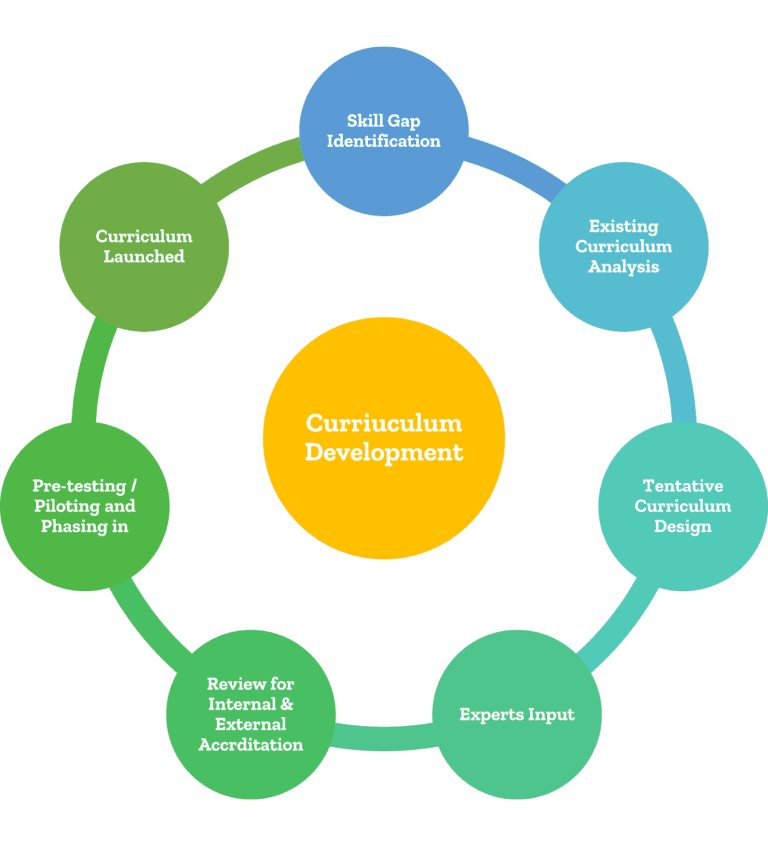Curriculum Development Process
At Tropical Consult, we understand the importance of developing effective, industry-relevant, and market demand-driven curriculum and training materials. Our team of experts is well-equipped to assist organizations in this endeavor, utilizing a comprehensive curriculum development process that
ensures the creation of interactive and occupationally standard materials.
Our process begins with skill gap identification, where we collaborate with your organization to identify the specific knowledge and skills required within your industry. We then conduct an analysis of any existing curriculum to determine areas of improvement and identify gaps that need to be addressed.
Based on our findings, we proceed to the tentative curriculum design phase, where we develop a preliminary framework that aligns with your organization’s training goals. During this stage, we actively seek input from industry experts who provide valuable insights and ensure that the curriculum is up to date with the latest industry trends and practices.
Once the initial design is complete, we conduct a thorough review of the curriculum to meet both internal quality standards and external accreditation requirements. This ensures that the curriculum not only meets your organization’s needs but also adheres to industry standards and recognized certifications.
To further enhance the effectiveness of the curriculum, we engage in pre-testing to gather feedback and make necessary adjustments. We then move on to piloting or phasing in the curriculum, allowing for real-world testing and fine-tuning based on the experiences and feedback of learners and instructors.
Finally, after incorporating all the necessary refinements, we launch the curriculum, equipping your organization with comprehensive and engaging training materials that address industry-specific demands.
By following this curriculum development process, Tropical Consult experts can assist your organization in creating curriculum and training materials that are effective, industry-relevant, market demand-driven, interactive, and occupationally standard. Our commitment to incorporating expert input, conducting rigorous reviews, and actively involving stakeholders ensures that the resulting curriculum meets the highest standards while also
catering to the specific needs and demands of your organization and the industry at large.

Importance of Curriculum Development Services:
- Addressing Skill Gaps: By identifying skill gaps within the organization or industry, curriculum development ensures that training programs are designed to bridge these gaps. This helps to enhance the knowledge and skills of employees, making them more competent and effective in their roles.
- Industry Relevance: Developing a curriculum that is aligned with industry standards and practices ensures that employees are equipped with the most up-to-date knowledge and skills. This relevance enhances their ability to perform tasks efficiently and keeps them competitive in the market.
- Meeting Market Demand: Curriculum development takes into account market demand and trends. By incorporating industry-specific knowledge and skills, organizations can ensure that their employees possess the competencies required to meet the needs and expectations of customers and clients.
- Workforce Readiness: Curriculum development ensures that employees possess the necessary knowledge and skills to excel in their roles, making them better prepared for the demands of the job and increasing overall workforce readiness.
- Interactive Learning Experience: Well-designed curriculum promotes interactive and engaging learning experiences. It incorporates various instructional strategies, such as hands-on activities, case studies, and simulations, which enhance learner engagement and retention of knowledge.
- Standardization: Curriculum development establishes standardized learning outcomes and objectives. This ensures consistency in the knowledge and skills acquired by employees, regardless of their location or department within the organization.
- Enhancing Employee Performance: A well-developed curriculum provides employees with the necessary tools and knowledge to perform their jobs effectively. It helps them develop the required competencies, leading to improved job performance, productivity, and overall organizational success.
- Accreditation and Compliance: Developing a curriculum that aligns with industry standards and recognized certifications facilitates the accreditation process. It ensures that the organization meets the required regulatory and compliance standards, enhancing credibility and trustworthiness.
- Adaptability to Change: Effective curriculum development enables organizations to adapt to changes in the industry, technology advancements, and evolving market needs. It equips employees with the skills to navigate and embrace new challenges and opportunities.
o Increased Organizational Performance: By investing in curriculum development, organizations can enhance overall performance and productivity. Employees
equipped with relevant and up-to-date knowledge and skills that contribute to the achievement of organizational goals and success.